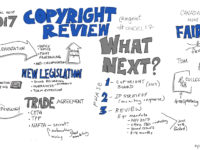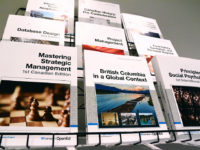Earlier this week, I submitted my copyright review brief to the Industry Committee. The brief tracks my opening comments to the committee closely, focusing on the data arising from five issues: educational copying, site blocking, the so-called value gap, the impact of the copyright provisions of the CUSMA, and potential reforms in support of Canada’s innovation strategy. Due to a 2,000 word limit, the committee version will be a slightly condensed version of my original. I’ve posted both online (original version, submitted version).
Post Tagged with: "fair dealing"
The State of Canadian Copyright: My Copyright Review Appearance Before the Industry Committee
With the Industry committee’s copyright review winding down, I appeared yesterday before the committee to discuss the state of Canadian copyright. The wide ranging two hour discussion focused on everything from fair dealing to crown copyright to concerns that publishers don’t fairly compensate authors for their digital licensing revenues. My opening statement placed the spotlight on five issues: educational copying, site blocking, the so-called value gap, the impact of the copyright provisions of the CUSMA, and potential reforms in support of Canada’s innovation strategy. An audio version and transcript of the opening statement is posted below.
Misleading on Fair Dealing, Part 10: Rejecting Access Copyright’s Demand to Force Its Licence on Canadian Education
My series on misleading on fair dealing concludes today with a post on Access Copyright’s demands for copyright reform. The copyright collective’s strategy is simply to force educational institutions to pay for its licence. It seeks to do so through two legal reforms: (i) restrict the use of fair dealing for education and (ii) massively increase the risk of liability through the imposition of statutory damages. The proposed reforms run directly counter to Canada’s longstanding commitment to balanced copyright, would reduce choice and innovation in licensing content online, and leave students and taxpayers facing risks of multi-million dollar liability that far exceeds the value of any copying.
This ten part series has addressed many of the misleading claims that have surfaced in recent months about fair dealing and copying practices in Canada:
Misleading on Fair Dealing, Part 9: The Remarkable Growth of Free and Open Materials
“Free” materials for educational purposes are sometimes derided as sub-standard works based on the premise that you get what you pay for. Inherent in the argument is that value is associated with cost and that turning to materials without cost means relying on materials without value. Yet the reality is that free materials are free as in “freely available” with the costs of production or business models that support those works rivalling conventional publication approaches. Free or openly available materials are not outliers. For example, the University of Guelph told the Industry committee that 24 per cent of materials in their course management systems consisted of open or free online content.
The series on misleading on fair dealing continues with an examination of freely available materials, including four sources: public domain works, open educational resources, open access publishing, and hyperlinking to third party content (prior posts in the series include the legal effect of the 2012 reforms, the wildly exaggerated suggestion of 600 million uncompensated copies each year, the decline of books in coursepacks, the gradual abandonment of print coursepacks, the huge growth of e-book licensing, why site licences offer better value than the Access Copyright licence, my opening remarks to the Standing Committee on Canadian Heritage, and transactional licensing).
Misleading on Fair Dealing, Part 8: The Access Copyright Fight Against Transactional Licensing
The series on misleading on fair dealing continues with a post on transactional licensing and Access Copyright’s inexplicable opposition to a licensing system that currently generates millions of dollars in revenue for publishers and authors. Transactional licensing, which involves pay-per-use licences for specific uses not otherwise covered by institutional site licences, collective licences, or fair dealing, is widely used to ensure universities and colleges are compliant with copyright law (prior posts in the series include the legal effect of the 2012 reforms, the wildly exaggerated suggestion of 600 million uncompensated copies each year, the decline of books in coursepacks, the gradual abandonment of print coursepacks, the huge growth of e-book licensing, why site licences offer better value than the Access Copyright licence, my opening remarks to the Standing Committee on Canadian Heritage).











